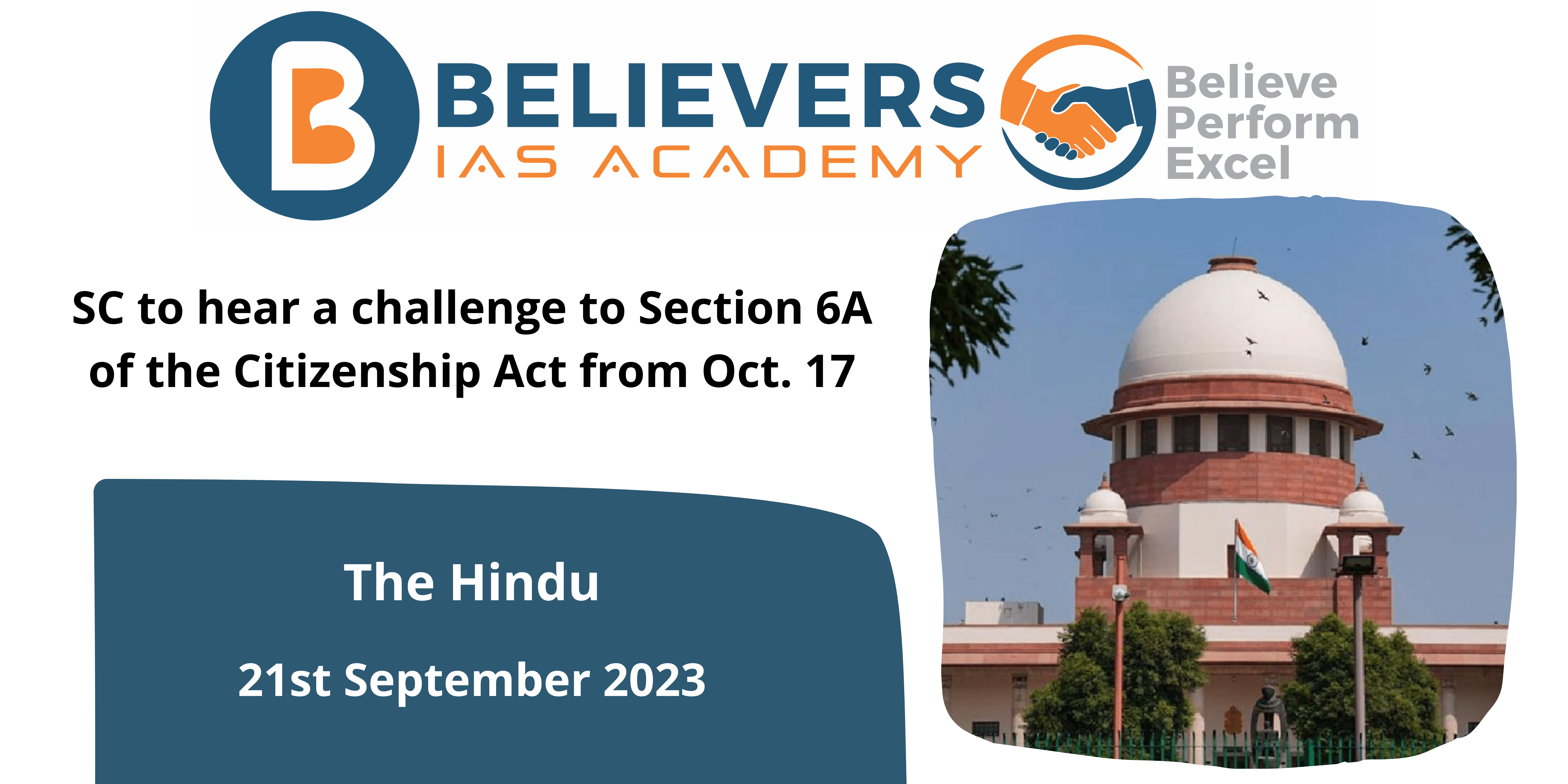SC to hear a challenge to Section 6A of the Citizenship Act from Oct. 17
Context
On Wednesday, a Constitution Bench chaired by Chief Justice of India D.Y. Chandrachud resolved to hear several petitions contesting the constitutionality of Section 6A of the Citizenship Act, 1955, beginning on October 17.
What is section 6A of the Citizenship Act?
- People who entered India between January 1, 1966 and March 25, 1971, are eligible to register as citizens under the special clause of Section 6A of the Citizenship Act of 1955.
- In 1985, this clause was added to the Act.
- Per the Assam Accord, which was signed on August 15, 1985, Section 6A was inserted into the Act.
- To safeguard Assamese culture, legacy, and social identity, the government and the leaders of the Assam Movement signed the Accord.
- The deadline for entering the state is March 24, 1971, according to Section 6A. Anyone who enters the state after that point will be regarded as an “illegal immigrant.”
What is the Assam Accord?
- A Memorandum of Settlement (MoS) known as the Assam Accord was signed on August 15, 1985. The agreement put an end to a six-year campaign to identify and expel “illegal” Assamese residents. The All Assam Students’ Union (AASU), the All Assam Gana Sangram Parishad (AAGSP), and the Union government all signed the agreement.
- The agreement committed to upholding the Assamese people’s political, economic, and cultural rights.
- All immigrants who entered Assam before to January 1, 1966, were welcome, according to the Assam Movement’s leaders.
- The agreement established March 24, 1971, as the deadline for citizenship recognition. Up until the cutoff date, immigrants would have the same privileges as Indian citizens.
- Prime Minister Rajiv Gandhi, Minister of the Central Home, Shankarrao Chavan, and the Assamese leader Prafulla Kumar Mahanta
How is the Challenging of Section 6A of the Citizenship Act going to impact the NRC?
- Inclusion of individuals: Individuals will still be eligible for inclusion in the NRC if Section 6A is upheld as constitutional, which would mean that everyone who entered Assam before certain dates and meets the requirements stipulated in the clause will be included. This would probably keep their citizenship the same as it is now.
- Exclusion of Individuals: On the other hand, if the court makes Section 6A unlawful, it may allow for a reevaluation of the status of those who were added to the NRC due to this clause. This might result in their removal from the NRC, which would have serious ethical and practical ramifications.
- Impact on Upcoming NRC Procedures: The Assam NRC is a continuous procedure designed to identify and confirm the citizenship status of people residing in the state. The conduct of future NRC processes and who is eligible for inclusion may be affected by the outcome of the constitutionality challenge to Section 6A.
- Complex Legal and Administrative Implications: Regardless of the court’s verdict, there will probably be complicated legal and administrative repercussions. The inclusion of people in the NRC will continue to be governed by Section 6A if it is affirmed. There can be difficulties in reassessing the status of those who were previously included based on this provision if it is invalidated.
What are the challenges faced by the NRC since its inception?
- Complex Documentation Requirements: One of the biggest obstacles for those trying to get on the NRC is having to verify their Assamese origin and residency through a ton of paperwork. Many people, particularly in rural and economically underdeveloped areas, do not have access to or struggle to obtain the necessary documentation.
- Issues with Legacy Data: To determine a person’s citizenship, the NRC procedure mainly relies on “legacy data” from a variety of historical documents. However, concerns with name variants and spelling changes, inaccuracies in these documents, and other factors have made it difficult to confirm a person’s citizenship status.
- Marginalized Group Exclusion: There have been worries that the NRC process may unfairly harm some marginalized groups, such as women, indigenous populations, and linguistic and religious minorities. These groups might encounter more difficulties in supplying the necessary documentation or might be more susceptible to mistakes and inconsistencies in historical data.
- Legal and procedural difficulties: The NRC process entails complicated legal and procedural elements, and people may need legal aid to successfully traverse the system. Many people may find it difficult to obtain legal counsel, especially those who are struggling financially.
Conclusion:
The outcome of this case will have implications for the rights and status of individuals who fall under the purview of Section 6A and could have broader implications for citizenship and immigration policies in India. It will be closely watched by legal experts, policymakers, and the public.




